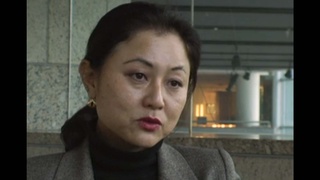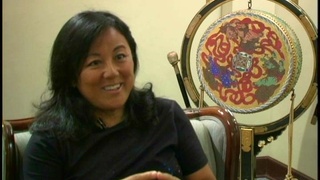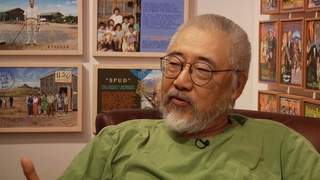Interviews
Insights from family on Japanese American internment
My dad told me about internment a long time ago. I think he told me really early. I know that when he told me, I didn’t quite grasp it. I was too young or at that point too interested in other things to be able to really understand the concept fully. And you’ll see as you get a little bit older. You’ll start to see it in history books, in school and whatnot. And you know, they devote…what do they devote? Like a half a page. You know, there’s a big picture of Pearl Harbor and this whole thing about how awful that was and then there’s a little thing about internment like in there somewhere.
And at that point, I think it struck me like, “That’s weird. Why don’t they…like my dad told me all about that and it’s weird that they didn’t really talk about it.” And I know over time…you know, I didn’t go on any big crusade to figure it out or anything. I think just over time, the collection of information happened and I started asking…I’d ask my relatives every once in a while. I’d ask people and the funny thing is they wouldn’t tell me. They’d give me such a watered down answer as to what their internment experience was. I think that that bothered me because of the “it-can’t-be-helped” attitude, the shikata ga nai attitude is so…it was so useful back then but these days, in my opinion right now, I just don’t…I think that that for my generation has been a little bit of…it’s been a little bit of a detriment, a little bit of a…like something that we personally wish that our older relatives and our elders would put aside to a certain degree so that we can learn about the story.
And so when I was making this Fort Minor record, my new record, it is like more of a solo kind of a project. It is more of a focus on my experiences mixed with my creative ideas. I’m making all the music, producing every song, mixing every song, and then lyrically, I wanted to get in some things that were my own. So I got into that subject a little bit, did an interview with my dad, who’s the second to youngest of 13. I mean they’re not all alive any more but 13 kids. And my aunt, who’s the oldest. So it’s the 2 perspectives. He was like 3 years old. She was in her 20s when…during the 40s when they were interned and I got…I think I got some really great insight into what happened.
Date: January 16, 2006
Location: California, US
Interviewer: Chris Komai and John Esaki
Contributed by: Watase Media Arts Center, Japanese American National Museum
Explore More Videos

A memorable CWRIC testimony of an unjust situation
Judge, only Japanese American to serve on CWRIC.

Camp stories impact on her career
Sansei judge on the Superior Court of Los Angeles County in California

Concentration camp from a Japanese mother’s point of view (Japanese)
Shin-Issei from Gifu. Recently received U.S. citizenship

Fair Play Committee
(1916-2010) draft resister, helped form the Heart Mountain Fair Play Committee

Wanting to take a stand
(1916-2010) draft resister, helped form the Heart Mountain Fair Play Committee

Ostracized by the camp newspapers
(1916-2010) draft resister, helped form the Heart Mountain Fair Play Committee

Arrested in camp for trying to leave
(1916-2010) draft resister, helped form the Heart Mountain Fair Play Committee

Dusty Weather at Topaz, Utah
(b. 1934) Award-winning Disney animation artist who was incarcerated at Topaz during WWII

Mother in Camp
(b. 1934) Award-winning Disney animation artist who was incarcerated at Topaz during WWII

Donating clothes to the Japanese interns (Japanese)
(1900–1996) The mother of Nikkei Brazilian immigration

Interrogation by police (Japanese)
(1900–1996) The mother of Nikkei Brazilian immigration

Necessary apologies (Spanish)
(b. 1962) Peruvian Poet, Okinawan descendant


Getting measles at the camp
(b. 1938) Japanese American painter & printmaker

Differences between Parents
(b. 1938) Japanese American painter & printmaker
